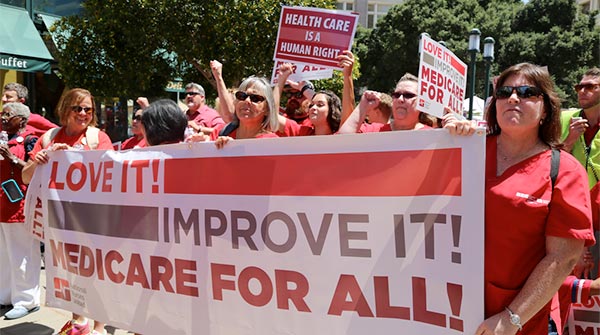News
Why Democrats should put Medicare for all in platform

When Democrats gather in Orlando on Friday to act on their party's platform, they should present a vision for the future beyond just defeating Donald Trump.
That should include a platform that promises meaningful action on the climate crisis, opposition to the Trans Pacific Partnership, a $15 an hour minimum wage — and another issue that affects everyone, health care.
Meeting in St. Louis June 24, the platform drafting committee rejected an amendment pledging the Democratic Party to fight "for a Medicare for all single-payer health-care system to guarantee health care as a right, not a privilege, to everyone in this country."
The proposal failed on a 7-6 vote with all the appointees of Sen. Bernie Sanders in support and all the appointees of former Secretary of State Hillary Clinton opposed.
As the presumed nominee, Clinton, who emphatically said earlier this year that single payer "will never, ever come to pass," would not be the first general election candidate to have a platform that conforms to their views.
But shouldn't the Democratic Party also be concerned about what public policies are best for the country as a whole?
While the Affordable Care Act has implemented some important improvements, the law has still left for too many behind.
A New York Times/Kaiser Family Foundation survey in January disclosed that at least 20 percent of people under age 65 with health insurance have problems paying their medical bills — 63 percent of those said they used up all or most of their savings; 42 percent took on an extra job or more work hours; 14 percent moved or took in roommates; 11 percent turned to charity.
Real-life stories abound. Geraldine Schaumburg, a San Diego registered nurse, testified to the platform-drafting committee that she had to "use up all my life savings to cover my bills" after a life-threatening incident. Even though she had insurance and pays her premiums, "I can't afford to use my insurance because my life-saving medicine and my necessary lab work are out of my reach."
What Schaumburg says she is forced to do is drive across the border to Mexico, where she pays $75 a year for full medical and dental coverage "so I can afford to see a doctor and pay for my medications at one-fifth of what I would pay for in the U.S. In America we have access to health insurance but not access to health care. When you marry a for-profit insurance system with health care, you get a system based on denying and reducing any access to care."
Even with its gains, the ACA was not good enough. It leaves tens of millions on the outside, at the mercy of a system based on profits and ability to pay, not patient need. Cost controls are minimal, insurance giants employ warehouses full of accountants who are experts at gaming the system, and our health remains a commodity.
Even those who have been able to finally get insurance through the ACA exchanges find that the more comprehensive plans have large out-of-pocket costs, and face double digit premiums hikes in November by insurers who kept initial premiums lower to harvest new paying customers.
Further, significant numbers of people with ACA plans are finding their coverage dropped, or substantially changed, and are then advised to "shop around" for new coverage. As if picking out a health insurance plan, with all the arcane paperwork, fine print, confusing options on what is covered, how much your out-of-pocket costs are, what providers are in your network, and what unlisted surprises you will get with your medical bills, is as simple as deciding which breakfast cereal to buy in the grocery store.
Guaranteed health care for all must be a uniform, national obligation that the Democratic Party makes a priority, not a vague concept dependent on the vagaries of which states will pass Medicaid expansion.
A platform that declares health care is a "right" without a specific plan of how to make sure every American will have the surety of receiving care when and where they need it is little more than empty rhetoric.
Piecemeal reforms are like putting a Band Aid on a hemorrhage. And the broad public knows it. Recent polls show 58 percent of all Americans, and 81 percent of Democrats, favor a publicly financed Medicare for all single-payer system.
In the days of Franklin D. Roosevelt and Harry Truman, the Democratic Party stood for a national system of guaranteed health care for all. It's long past time for the Democrats to return to its roots and carry out the full promise of real reform.
RoseAnn DeMoro is executive director of National Nurses United and the California Nurses Association.